
|

A bicycle must make a tradeoff among reliability, versatility, light weight -- pick any two, or some compromise among the three. Outside areas with heavy bicycle use and closely-spaced bicycle repair services, any bicyclist will have to perform some common on-road repairs, or ride with a companion who can perform them, or call for a ride now and then. Even the simplest, most rugged beach cruiser bicycle can't offer the trouble-free service you would expect of a lawnmower, car or refrigerator. Still, the mechanical simplicity of the bicycle and the resulting ease of common repairs, performed with lightweight tools, allow bicycling to be a practical travel mode.
. This article identifies the tools needed to perform common on-road repairs, and links to other articles on this site that give detailed repair instructions. There is also good information in books and online.
![]()
![]()
What tools should you carry, to get you home or to a bicycle shop?
Stories abound of bicyclists who go on tour lugging 10 or 15 pounds of tools, ready to fix almost anything on their bicycles.
At the other extreme, a road racer carries no tools. The team mechanic follows in the team car, ready to supply a replacement wheel or entire bicycle as needed.
A reasonable toolkit for a more typical bicyclist weighs a pound or two and covers the most common on-road repair needs. The weight can be even less on a modern bicycle which uses exclusively Allen-wrench fittings. The tools fit into a small bag which straps to the underside of the saddle, or which can be carried in a pannier or touring bag.
A small tool kit allows a bicyclist to get rolling again almost every time something goes wrong. You might carry some tools which you don't need for your own bicycle, to lend a helping hand to other bicyclists who are stranded. That has been the start of many a beautiful friendship!
Here's a quick list; longer descriptions follow. You may not need all of these for your bicycle:
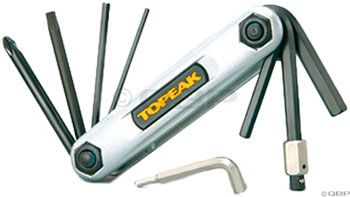
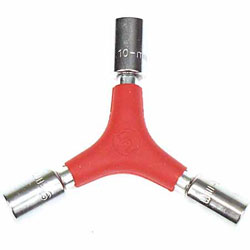
![]()
![]()
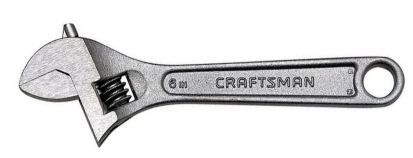
Park universal crank puller
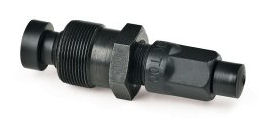

Park folding chain tool
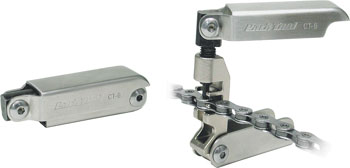
![]()
![]()
Especially if you are traveling in rural areas, you do well to carry a few additional supplies:
Unior cassette lockring tool
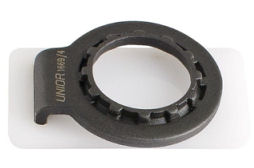
If your bicycle has a freewheel, you could carry a freewheel extractor, but then you will have to borrow the use of a vise or large adjustable wrench unless you are lucky enough to find the tool which lets you use the handlebar stem. As I recall, this tool was made only to fit SunTour freewheel extractors.
Freewheel extractor holder with freewheel extractor
![]()
Necessity is the mother of invention. More articles in this series are in the works. Two are complete as of now:
On-Road Wheel Repairs -- to get you rolling again if your bicycle has suffered a broken spoke or bent wheel.
Emergency Frame Repairs -- If your bicycle has a steel frame and fork, an emergency repair is possible in a metalworking shop anywhere in the world, and sometimes even out on the road.
![]()
![]()
Last Updated: by John Allen